Location
Our Idaho Location
Located in Boise, Idaho, Northpoint Recovery is proud to offer quality drug and alcohol detox as well as alcohol and drug rehab in the Treasure Valley.
- Idaho
2335 E. State Ave,
Meridian, ID 83642
"The plan was to quickly evaluate his health and devise a treatment plan. The doctor was planning on a life-saving mission."
~Attorney William Mauzy, speaking of the intervention that was planned for Prince before he died.
On April 21 of this year, the legendary musical superstar Prince Rogers Nelson - known eponymously by his first name - was found dead at his Minnesota estate. He was only 57.
To most of the world, the death of Prince at such a relatively young age was completely unexpected. The diminutive performer had a reputation for living an extremely clean lifestyle - vegan meals, no alcohol, and no drugs.
But even before the medical examiner's autopsy report revealed that Prince died from a self-administered accidental overdose of the powerful synthetic opioid painkiller fentanyl, stories began to surface that painted an altogether different picture - one that was at odds with the public's perception of the singer's supposedly Spartan aesthetic.
Despite - or perhaps because of - his penchant for energetic stage performances, Prince lived with debilitating hip and knee pain, and the one thing he found to help him manage it ultimately took his life.
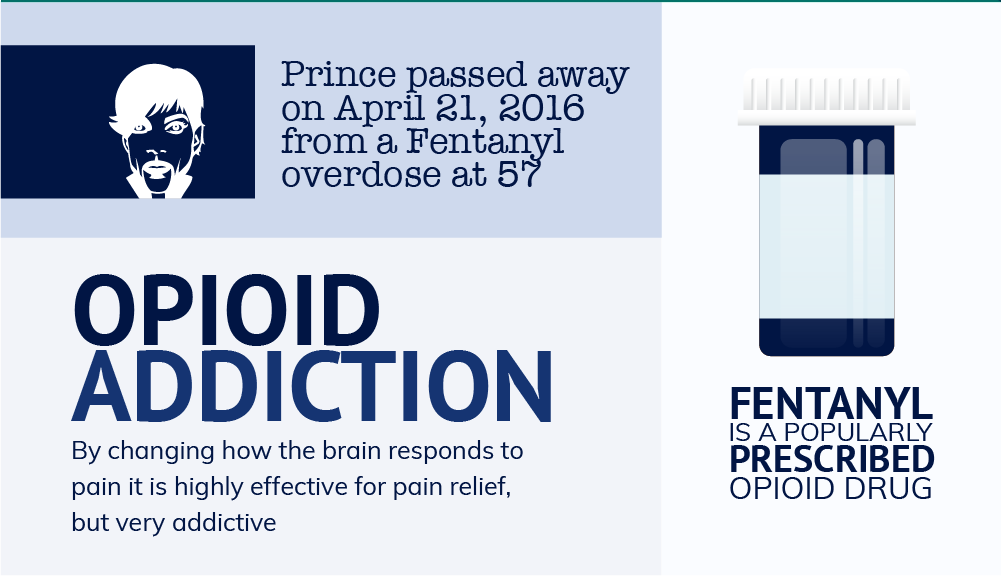
Opioid drugs are medications that are typically used to relieve pain. They’re only available by prescription, unless you’re using illegal opioids such as heroin or opium. These have been found to have no medicinal value in the United States.
An opioid addiction can result from:
Once you’re addicted to opioid drugs, you have a disease of the brain. Whereas you may have had a choice in using at one time, that choice no longer exists. You effectively become a slave to the addiction. You can’t help but want to keep using them, and this is coupled by powerful urges to do so.
Fentanyl is one of the more powerful (and popular) opioid drugs. It is highly effective at treating pain when other methods of treatment have failed. It doesn’t take long to form an addiction to this drug.
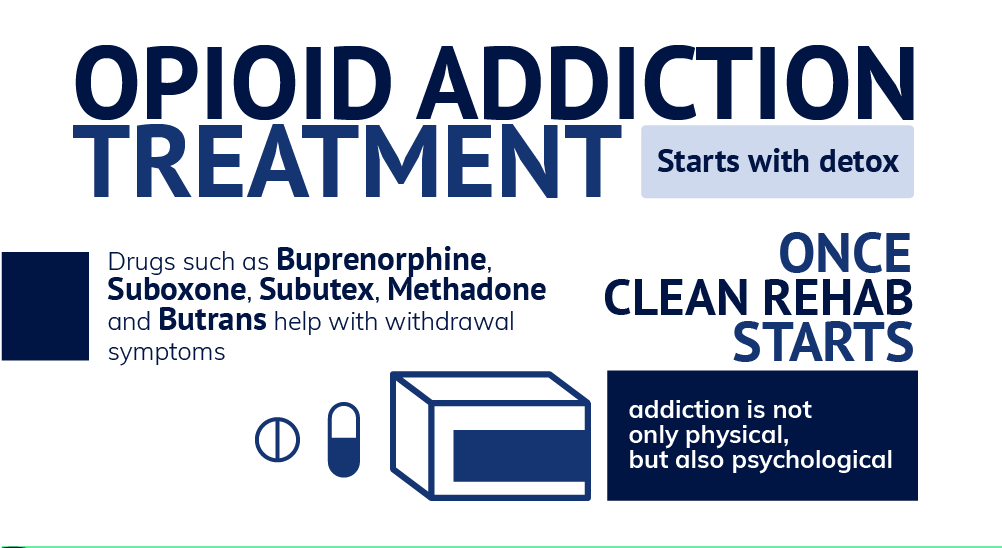
Today, we are very fortunate to have so many great options for treating opioid addiction. Most people will begin during a period of opiate detox. This is a way of allowing the body to adjust to no longer having the drug. Stopping the use of opioid drugs will result in withdrawal symptoms, and detoxification can help. Usually, the individual’s dosage of opioids will be tapered down during this process. This further minimizes the severity of withdrawal.
These medications block the opioid receptors in the body. They help with withdrawal symptoms and they can also make other opiate drugs ineffective.
While these medications are a wonderful addition to opioid treatment, they must not be misused. In some cases, they themselves can be addictive. They should always be used in conjunction with an excellent opioid rehab program. This is because an opioid addiction is more than just physical; it is also psychological.
Although opioid treatment is important, ongoing care for addiction is vital. People have to commit to getting treatment long-term. If they don’t, they are much more likely to relapse.
Most people begin using opioid drugs because they received a prescription for them. They may have known that they were addictive, but they didn’t necessarily believe it.
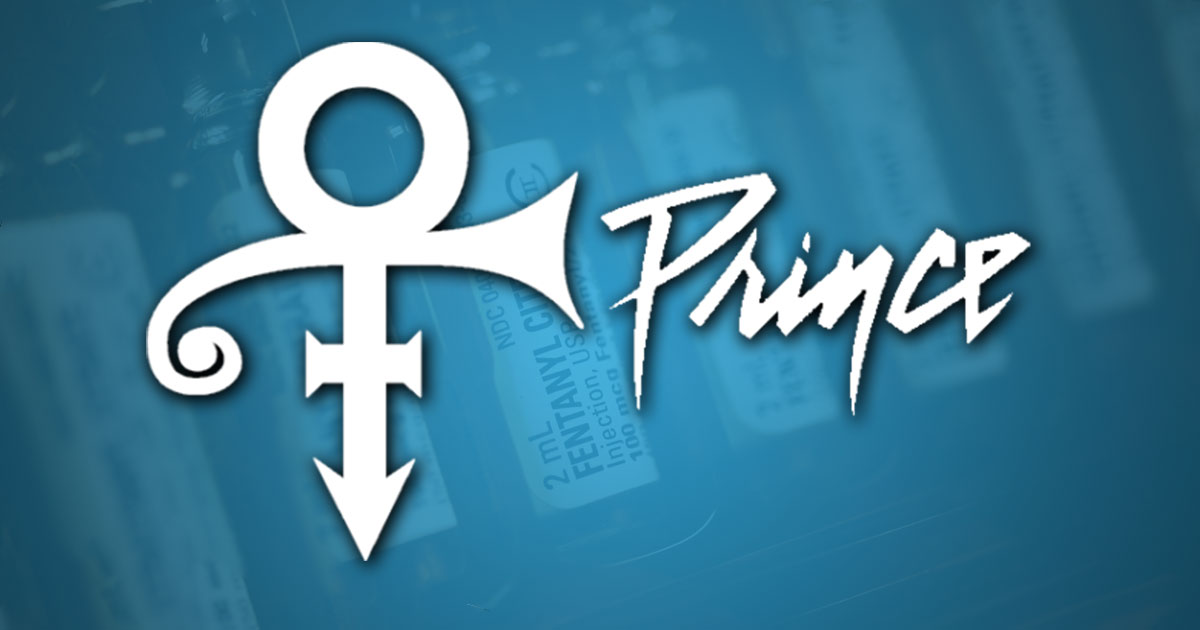
When someone abuses a drug long enough, that abuse will eventually become an addiction. According to the National Institute on Drug Abuse:
It’s amazing to see how much the use of these drugs has grown even over the last few decades. If the experts are correct, this is a problem that’s only going to get much worse.
Read great recovery stories, learn about the latest treatments, and find out how addiction affects yourself and your loved ones in our blog.
Read Our BlogIt’s clear that our country is facing an opioid epidemic. Every year, the problem escalates more and more. The statistics even support this fact. According to the American Society of Addiction Medicine:
It appears that more people than ever are seeking help for their addictions. However, that doesn’t do much to help the pain of losing one of the best-loved musicians in the world. The loss of Prince was something that shook our country to the core. It hurts to know that he’s gone, and it’s hurts even more to know that it could have been prevented.
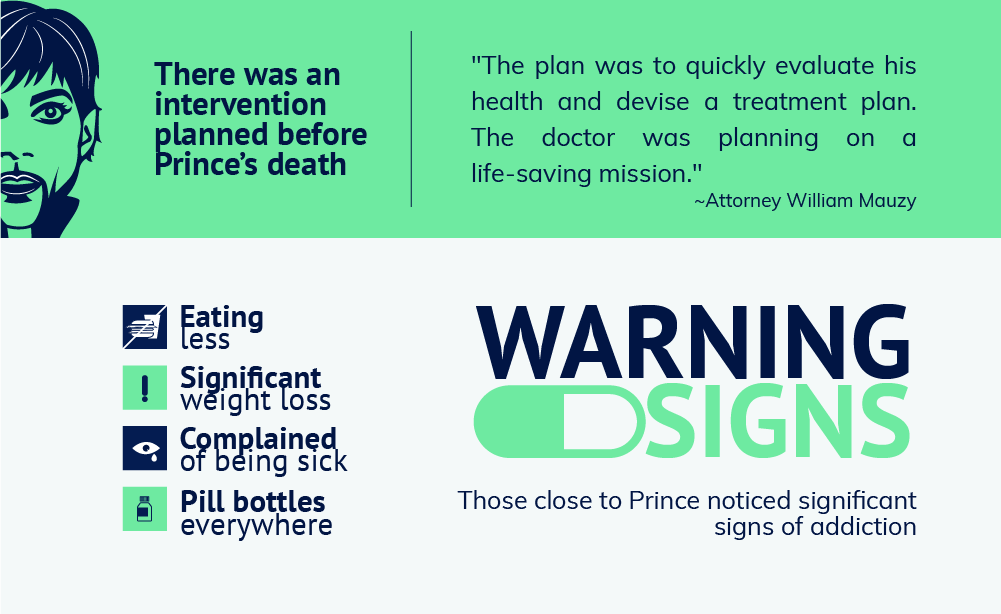
Prince lived an intensely independent-yet-private lifestyle that may have contributed to his ability to keep the secret of his prescription misuse from everyone except those closest to him.
In the last month or so before he died, Prince's inner circle began to see signs of a problem - he was eating less, losing a significant amount of weight, and complained of being sick "weeks at a time". At the time of his death, Prince only weighed 112 pounds.
Then there was the matter of the plane that had to make an emergency landing because Prince was suffering from what was reported at the time as "flu-like symptoms". Subsequent accounts reveal that Prince actually overdosed on Percocet - yet another prescription opioid painkiller - and had to be revived with a life-saving overdose antidote "save shot".
Friends were worried enough for Prince's health that they contacted Dr. Howard Kornfeld, a prominent addiction treatment specialist. Dr. Kornfeld scheduled a visit at Prince's home for April 22. The plan was to do an intervention.
As it turns out, that was one day too late. In fact, help may have even been minutes too late.
Dr. Kornfeld's son Andrew, who works with his father, arrived at Prince's Paisley Park estate at 9:30 AM on the morning of the 21st. At first, the singer could not be located, but minutes later, they found him unresponsive in an elevator.
Andrew Kornfeld, who had just arrived to start the evaluation process, was the one who had to make the 911 call. Because he was unfamiliar with the address, he simply told the dispatcher, "We're at Prince's house."
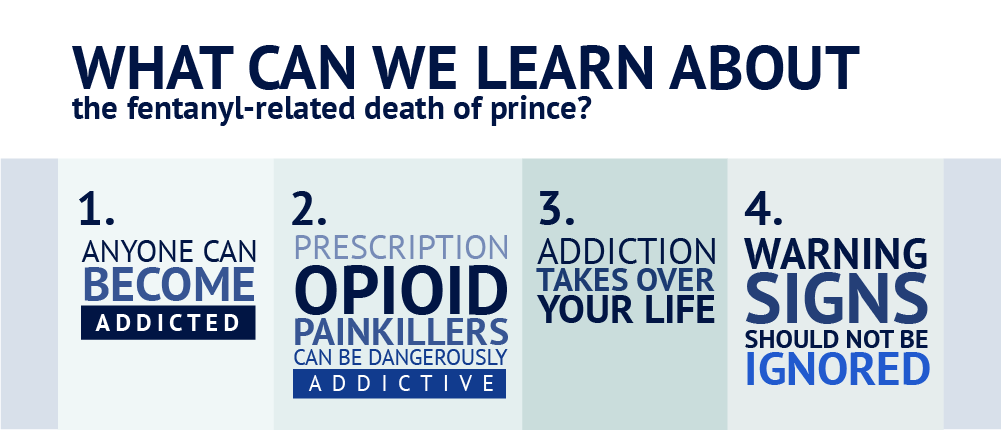
Fentanyl is a synthetic opioid medication that is prescribed to help patients suffering with severe, acute pain. Like other opioids, it does not truly "block" the pain. Rather, what it does is changes the patients' perception of that pain, and as a side effect, can induce a euphoric state of relaxation and well-being. This is why opioids are such popular drugs of abuse.
Fentanyl is extremely potent - it is up to 100 times more powerful than morphine, and 30-50 times stronger than pharmaceutical-grade heroin of 100% purity.
As with other powerful opioids, a fentanyl overdose can be caused due to respiratory arrest/depression - when the patient's breathing slows or altogether stops. This is why opioids are particularly dangerous for someone who already has a breathing condition, such as asthma.
Opioids can also induce vomiting, so it is not unheard of for a person who mixes alcohol and fentanyl to choke to death on their own vomit.
When fentanyl is acquired illegally, it is frequently "cut"- mixed in - with other illicit drugs such as cocaine or heroin, amplifying the effects of each and greatly increasing the hazard. This is usually done without the user's knowledge, and there is no way to tell.
Unfortunately, the death of Prince is only symptomatic of a larger and still-growing problem in the United States.
If there is anything that we need to understand from this tragedy, it is this inescapable fact - ANYONE can struggle with substance abuse. Even though he was rich, famous, and adored by the public, Prince had the same human frailties as the rest of us -
But perhaps the biggest lesson we can all learn and use in our own lives is that you can never ignore the telltale warning signs of prescription medication misuse, dependence, abuse, and addiction. Help was on the way, but in Prince's case, it came one day too late.
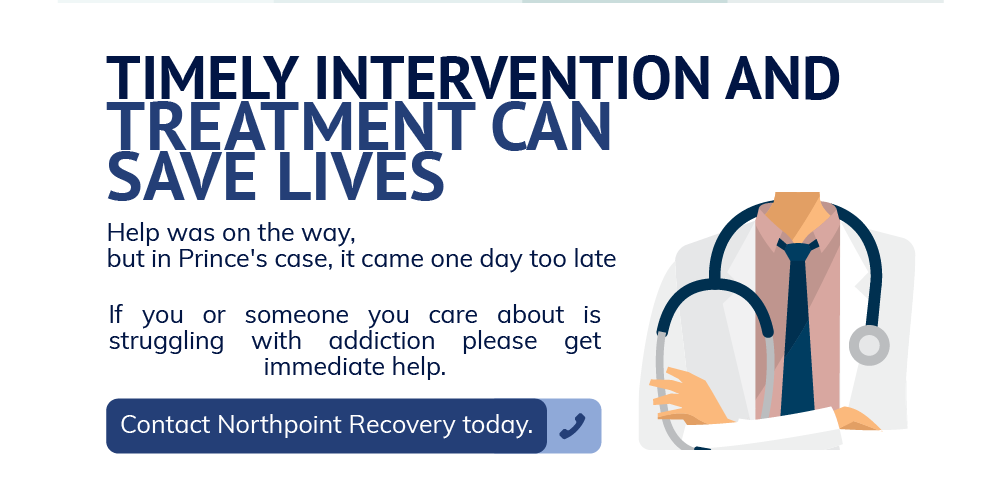
If you or someone you care about is struggling with prescription medication abuse, dependency, or addiction - whether to opioid painkillers or benzodiazepines - you can get the immediate help you need by contacting Northpoint Recovery today. Please don’t put it off. If you do, it may eventually become too late for you to get the help you need.

Our admissions coordinators are here to help you get started with treatment the right way. They'll verify your health insurance, help set up travel arrangements, and make sure your transition into treatment is smooth and hassle-free.
Contact Us